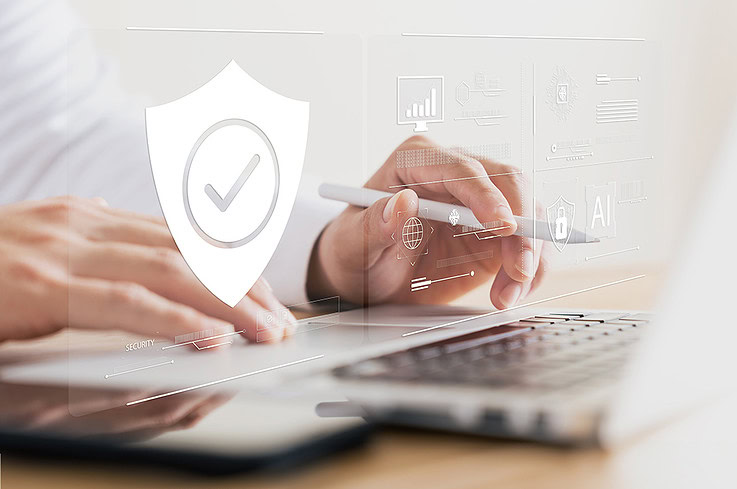Beneficial Ownership
Beneficial ownership is a process that helps banks understand who the owners of an account are. It is an important measure to ensure transparency and compliance with regulations. By gathering this information, we are able to create a secure and reliable financial system for their customers.

Regulatory Change: Beneficial Ownership Certification Information Requirements
The U.S. government has amended customer due diligence rules to require financial institutions, like Nodaway Valley Bank (NVB), to collect and verify specific information from legal entities (businesses) establishing relationships with NVB. The new rules are frequently referred to as beneficial ownership or beneficial ownership certification.

Required Documents Checklists
These checklists are linked below and separated by legal entity type.
For businesses who would like to open a new NVB account, we are required to collect certain information about the owners/controllers of the company. To help you prepare for opening your account at NVB, we have created account onboarding checklists.

Why did this change occur?
The new rules help fight financial crime. Because legal entities can be abused to disguise involvement in money laundering, terrorist financing, tax evasion, corruption, fraud, and other financial crimes, requiring the disclosure of key individuals who ultimately own and/or control a legal entity helps law enforcement investigate and prosecute these crimes.

Banking relationships and the new rule
The beneficial ownership rules apply to all formal banking relationships established to provide or engage in services, dealings, or other financial transactions, including a deposit account, a transaction or asset account, a credit account, or other extension of credit. An account also includes a relationship established to provide a safety deposit box or other safekeeping services, or cash management, custodian, and trust services.

Exceptions to the new rule
Legal entities not impacted by the beneficial ownership requirement include sole proprietorships, unincorporated associations, or natural persons opening accounts on their own behalf.
If you have questions about the beneficial ownership certification requirements, please feel free to contact your NVB relationship banker or lender.
Frequently Asked Questions
Find the answers here!
-
Why is my company being asked to sign a Beneficial Ownership Certification Form?
The U.S. government now requires financial institutions to collect and verify specific information from any legal entity (primarily businesses) establishing a new banking relationship. This includes existing customers updating an existing account, opening a new account, renewing a certificate of deposit or initiating or renewing a loan.
These new rules help fight financial crime. Because legal entities can be used to disguise money laundering, terrorist financing, tax evasion, corruption, fraud, and other financial crimes, requiring the disclosure of key individuals who, a) benefit from ownership; and/or b) control a business, helps law enforcement investigate and prosecute these crimes.
All banks are required to collect this information. We appreciate your cooperation.
-
What is the definition of a 'beneficial owner'?
A beneficial owner is any individual who owns – either directly or indirectly – 25 percent (25%) or more equity interest in a legal entity.
-
What is the definition of an 'individual with significant management responsibility'?
Also referred to as the individual with control, this is the person with significant responsibility for managing the legal entity. Generally, this individual has the authority to act on behalf of the legal entity and make decisions related to financial relationships. For example, a chief executive officer, chief financial officer, chief operating officer, managing member, general partner, president, vice president, or treasurer. This person’s identity must by verified through a government issued ID or passport.
-
Is it possible for a person with significant management responsibility to open an account or negotiate loan terms, but not be an authorized signer?
Yes. The legal entity’s documents define who is authorized to open and/or sign on deposit accounts or borrow money on its behalf.
-
What personal information is required for each named individual on the certification?
We are required to obtain the legal name, physical address, date of birth, and social security number (SSN) for each person listed on the certification. A copy of their government-issued ID, driver’s license or passport is required for verification. Non-U.S. citizens must provide a passport number.
-
May the bank identify beneficial owners after the account has been opened?
The bank is required to collect information on beneficial owners at the time an account is opened. The account should not be funded or loan proceeds advanced until the signed beneficial certification has been received.
-
Does the change of authorized signers trigger collection of beneficial ownership certification for existing customers?
The bank is also required to update this information for a legal entity when a “significant event” occurs, such as a change in ownership or an individual that has significant management responsibility, i.e., an executive officer or senior manager including Chief Executive Officer, Chief Financial Officer, Chief Operating Officer, Managing Member, General Partner, President, Vice President or Treasurer requiring a change of authorized signers. Please advise us of any change in ownership or control so we may update our records.
-
Who should complete the certification form on behalf of the entity?
The individual with authority to request an account be opened or a loan be granted is the person to complete the certification. This could also be the person named as the individual with significant management responsibility, or someone who has been designated by that individual to establish bank relationships on behalf of the legal entity. The person who completes the form will sign it certifying the information is accurate to the best of his or her knowledge.
-
What if my company is owned by another legal entity?
Indirect ownership means the legal entity may be owned by one or more legal entities. We are required to obtain information on the individuals behind these layered entities who have 25 percent or more ownership in the legal entity. The bank is required to “drill down” to a natural person.
-
Is certification required when no individuals have 25 percent or more ownership?
Yes. You would simply mark the box indicating there are no individuals with beneficial ownership and complete the control section for the individual with significant management responsibility.
-
Are there any exceptions to the beneficial ownership rule?
There are limited exceptions to the collection of beneficial ownership information. It is not required of government agencies, publicly traded companies, sole proprietorships, or unincorporated associations (i.e., youth sports leagues, Scout troops, after- prom parent groups, bowling teams, etc.)
-
What is required for non-profit corporation or association?
The bank must determine whether the organization applying to open the account is a state chartered legal entity. Non-profit corporations or similar entities, including non-government organizations (NGO’s), charities and religious organizations (whether or not tax-exempt) are exempt from the beneficial ownership portion of the requirement, requiring only the information on the individual with significant responsibility to control, manage, or direct the entity be obtained, along with verification of their identity, i.e. a driver’s license or government issued ID. In most cases, the individual is also an authorized signer on the account.
-
Are accounts designated “doing business as” (DBA) exempt?
The bank must know the name of the underlying legal entity of any business that uses another name in public. For example, if a restaurant goes by the name “Taco-Taco,” but the legal owner is “Serious Brands, Inc.”, the bank must obtain beneficial ownership information on Serious Brands, Inc. as the legal entity.
-
Are trusts exempt?
Generally, personal trusts are exempt from these rules since they are created without a public filing. However, any trust created by the filing of a public document with the appropriate state office, such as statutory trusts or business trusts which are similar to corporations, are subject to these requirements.
-
How are Interest on Lawyers Trust Accounts (IOLTA accounts) treated for purposes of the beneficial ownership rule?
Under most state laws, an IOLTA is considered a non-statutory trust account. The bank must obtain certification of the individual with significant management responsibility and verify their identity, i.e. obtain government issued ID or driver’s license.
-
What will the bank do with this information?
We are required to maintain this information as part of the records associated with the legal entity. It is treated with the highest level of confidentiality and security as all other customer information.






